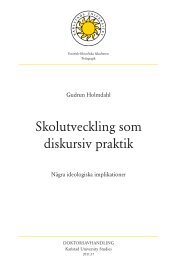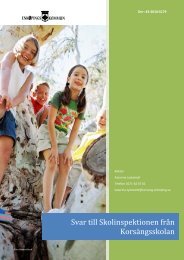FULLTEXT01
FULLTEXT01
FULLTEXT01
Create successful ePaper yourself
Turn your PDF publications into a flip-book with our unique Google optimized e-Paper software.
and that one always has the option to withdraw without any further<br />
explanations and under no circumstances negative consequences. In a<br />
collaboration project of the kind that I participated in, it is accustomed that<br />
research principals and research managers ensure that this kind of information<br />
is communicated in advance, and that informed consent is established between<br />
the representatives of the various parties involved. It should also be agreed that<br />
involvement takes place within normal working hours (Swedish Research<br />
Council, 2011). However, even so, there might be a dilemma when it comes to<br />
the informed consent requirement. If individuals among the school personnel<br />
oppose to participate in such an effort, that is, although the project is said to<br />
proceed within normal working hours, it may to some extent, be labeled as a<br />
problem, rather than respected as the reasonable consequence of the consent<br />
requirement. A further dilemma is that despite necessary information has been<br />
given about a research project, it may be difficult for participants to predict the<br />
consequences of one's own participation, such as how it can affect one to<br />
subsequently find himself quoted in an academic context (Wehterell, 2001).<br />
Participants must be assured confidentiality for example by me changing their<br />
names, and also excluding information in the text excerpts and statements<br />
which in any way may identify people (Swedish Research Council, 2002;<br />
Wetherell, 2001). However, it can be difficult to fully meet the requirement to<br />
remove information that might identify the participants. Foremost it can be<br />
difficult in an extensive co-funded, collaboration project with many actors<br />
involved. For all those who have been part of, or who have had information<br />
about the project in question, and these are quite a few people, it can be rather<br />
easy to deduce various facts to specific municipalities, authorities or even<br />
persons in the project. Examples would be data that is of great value to the<br />
actual study, but which, for those familiar with the case, can be traced to any of<br />
the actors involved. Therefore, it must, be emphasized that the purpose of this<br />
study is to highlight the ideological implications of the discursive practice. The<br />
purpose is by no means to identify in which extent individual „actors‟ may<br />
contribute to this, or to in any negative way, point out one or the other.<br />
As an ideology analysis of the kind I conduct is more of a generative process,<br />
the way to understand research data cannot be overseen from start. Even if it<br />
was possible, it is not necessarily relevant to in detail and continuously inform<br />
the participants about the theoretical outline and objectives of the study<br />
(Wetherell, 2001). According to the Swedish Research Council's (2002) Research<br />
ethics recommendations, the value „of the expected knowledge contribution should<br />
180






